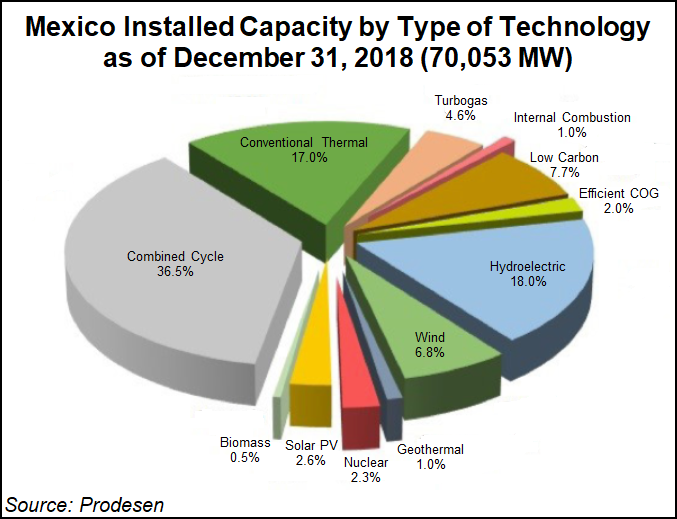Regulatory | NGI All News Access
Mexico Steps Up Push to Reduce Rampant Electricity Theft
For months, Mexican President Andrés Manuel López Obrador has stressed that the government will combat the scourge of gasoline theft, which generates billions in losses for the country. In recent weeks, that effort has incorporated a secondary target: electricity theft.

According to the state utility Comisión Federal de Electricidad (CFE), the largest buyer of natural gas for electricity, more than 59 billion pesos ($3 billion) of electricity were lost to theft from June 2018 to June 2019. The company reported last month that it loses around 17,000 pesos, or $860/minute as a result of electricity theft and that it detected nearly 70,000 illegal taps in homes and businesses across the country through the first five months of 2019.
The company registered as many as 133,000 cases of electricity theft in Mexico in 2016, up from 13,000 in 2013.
Across the country, small clamps, colloquially known as “little devils,” are attached to power lines to illegally access electricity. The largest concentration is in the state of Tabasco, according to the company.
In a press conference last month CFE CEO Manuel Bartlett emphasized the importance of cracking down on electricity theft to improve the financial health of the company.
“A company like ours can’t subsist if people aren’t paying for electricity,” he said. A cultural change is needed in Mexico where people historically “have a resistance to pay for electricity.”
Bartlett said wealth disparities in Mexico are a main driver to electricity theft. While he expressed sympathy for those in “desperate and difficult situations,” a goal of this administration and the CFE is to identify and seek reimbursement from residents and businesses that steal electricity.
“This is the big national company of the Mexican people and, to strengthen it, it is required and understood that you have to pay for electricity,” he said. “For that reason, they have to support the CFE. They have to pay.”
Members of Mexico’s senate are joining the call for government intervention to curb electricity theft. Last month Sen. Armando Guadiana of López Obrador’s Morena party proposed a law to combat the problem.
If approved, the law would apply fines and jail time to residents and businesses found stealing electricity. Additionally, public servants aware of theft but who failed to report it would also face fines and imprisonment, according to the text of the presentation.
In his presentation before the senate, Guadiana assured lawmakers that electricity theft is prevalent in Mexico and permeates all levels of society from poor communities to large-scale agricultural and business operations.
“It is vital to prevent and put an end to the robbery of electricity from the government of Mexico and CFE,” Guadiana said. “We hope that this proposal is analyzed by senators and that it is eventually approved…the amount of money lost through electricity theft is simply unacceptable.”
Should the law be approved, enforcement of it would be a major challenge in a country marked by high impunity rates and a poor record of institutional follow through, according to Mexico energy expert Gonzalo Monroy, managing director at consultancy GMEC.
“We have good laws and regulation in Mexico, but the problem is that we don’t have good enforcement or implementation,” Monroy told NGI’s Mexico’s GPI. “Often new laws are announced or approved, but there is no willingness to enforce those laws.”
He added said efforts to curb electricity theft, such as the proposed senate law, are feasible, though will require political will and additional investment by the CFE to improve operational efficiency of distribution lines to be properly implemented.
“It would be a significant effort to locate and enforce new regulation on members of Mexico’s informal economy, for example, that are known to steal electricity,” Monroy said. “It would require a lot of political will to enforce that and goes far beyond just approving new legislation.”
López Obrador reiterated during a press conference earlier this month that the government is determined to combat energy theft. According to the president, today there are around 40 illegal gasoline taps daily in the country, down from nearly 800/day in 2018. López Obrador said the government hopes for similar results in combating electricity losses.
Doing so will be challenging given the existing culture of theft in the country, said Wood Mackenzie’s Rodrigo Rosas, senior research analyst in Mexico City. He told NGI’s Mexico’s GPI that the president has encouraged residents of his home state of Tabasco not to pay for electricity for years, which might add to the challenge of enforcement.
“The current administration is using a strategy to cancel outstanding debts, in some cases erasing them and starting with a clean slate, but the truth is I don’t know how good of a plan that is,” Rosas said. “Electricity theft is a serious problem in the country,” he said, adding that incompliance with electricity theft has been promoted as a form of social protest in Mexico for years.
© 2024 Natural Gas Intelligence. All rights reserved.
ISSN © 2577-9877 | ISSN © 2577-9966 |
